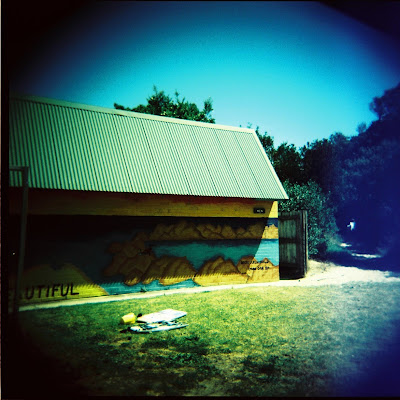24.1.12
some thoughts on the beach
Ah, the beach. That wonderful space unlike any other imaginable, which we in Australia are lucky enough to have at virtually every turn. It's a place that is governed by nature alone: witness her mockery when she buries man-made infrastructure over just a few years of changing tides; her majesty when she conjures up thunderous waves that only the most foolish surfers dare to face; or her wrath when she claims a small boat in a rip despite the best efforts of lifesavers, as was happening in the photo at the top of this post. Sometimes she is calm enough to bring serenity to the most tumultuous soul, other times she has enough powerful anger to frighten the most salt-encrusted seaside dweller. No matter the mood she presents, though, she is always raw beauty.
Could this explain the infinite allure of the beach for me and my cameras? Certainly, it plays a part. But there are other factors. As with so many other beloved photographic subjects, there is nostalgia. A childhood by the coast means that I have an essentially neverending store of memories on the sand and in the water. It's also part of the broader national memory, as we Aussies like to take pride in our beautiful beaches, which we have been doing for decades. For what is an Australian summer without the beach? One trip to Bondi is enough to confirm that tourists from all over the globe are fascinated by our iconic shores.
Beyond these somewhat obvious factors, however, there are also social and anthropological aspects of the beach that have long fascinated me. Socially, the beach is the great leveller. Rich, poor, young, old, white, black, thin, fat, devout, athiest - in theory, the beach unites people like very few other spaces can. All those things that govern our behaviour and define us in the real world - from race and class to religion and physical beauty - matter little once we are on the sand. It's as if by stripping off our clothes, we remove our superficial identities. As the immeasurably wise Rennie Ellis wrote of Australian beachgoers in his 1980s photography book Life's a Beach, 'Here, on neutral ground and stripped of their uniforms of pretension, they enjoy easy camaraderie that social convention may not have encouraged elsewhere.' We are all hot, and so we are at the beach. It's often as simple as that.
The beach is also a fascinating space in terms of the behaviour it fosters. The mere fact that walking around half- (or sometimes fully) naked is acceptable on the beach is an indication that there are a different set of rules down there. Inhibitions disappear, sexual energy is rife and people epitomise the carelessness of summer. This is reflected in countless movies: summer flings that take place at the beach struggle to transition into the real, class-defined world (Grease, Cocktail); teens go through rites of passage on their journey to adulthood, learning valuable life lessons before moving on to the next phase of their lives (Where the Boys Are, The Bikini Shop); and irresponsible youths are punished for their reckless abandon through death (Jaws) and law enforcement (Blackrock). The idea of the beach as an environment that cultivates extraordinary behaviour has been linked to the fact that the physical space of the sand - as it lies between land and sea, incorporating both but belonging to neither - is a liminal space whose separateness means that it rejects everyday society's customs. A rebel; volatile like its moods.
So these are a few of the reasons I am completely fascinated by the Australian beach. It's a special place that deserves awe, fear and respect. It deserves to be looked after. And, despite the massive volume of sometimes boring images that result, it truly deserves to be photographed.
Labels:
light leak,
slide
Subscribe to:
Post Comments (Atom)










No comments:
Post a Comment